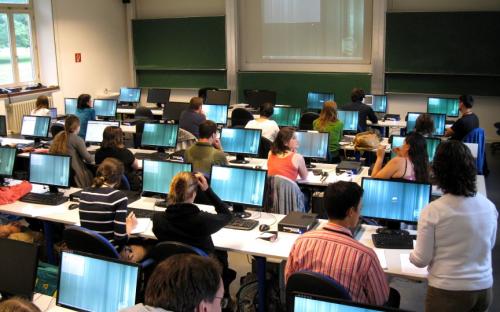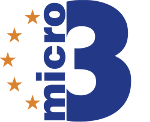- Home
- About
- OSD
- MyOSD
- Partners
- Work Packages
- WP 1Management & Coordination
- WP 2 (OSD)Ocean Sampling Day
- WP 3Oceanography & Environmental Data
- WP 4Standards and Interoperability
- WP 5Bioinformatics & Data Integration
- WP 6Exploring Ecosystems Biology
- WP 7Function and Biotechnology
- WP 8Intellectual Property (IP) Management for Marine Bioprospecting
- WP 9Dissemination & Outreach
- Public DeliverablesAll Micro B3's public deliverables
- Meetings
- Workshops
- Third Micro B3 Industry Expert Workshop
- Micro B3 Industry Expert Workshop
- Micro B3/OSD Analysis Workshop
- Micro B3 Stakeholder Workshop
- Micro B3 Summer School in Crete 2014
- Marine Metagenomics Bioinformatics
- Micro B3 Industry expert workshop
- EU-US Training 2013
- Micro B3 Statistics Training 2013
- MG4U Bioinformatics Training 2013
- Bioinformatics Training 2012
- EU-US Training 2012
Micro B3 Statistics Training: Background
Rationale & Target Audience
Within WP9 (Outreach & Dissemination), the Micro B3 project offers dedicated statistical training for developing the multivariate analysis skills of PhD students, postdocs, and senior scientists contending with complex ecological datasets.

Course Outline
In the first two days, the basic statistical and mathematical concepts needed to understand multivariate statistics will be presented. Special emphasis will be given to data visualization, outlier detection and variable distribution transformation. Further, similarity coefficient calculation will be introduced alongside clustering and ordination approaches which allow representation of multivariate structures in lower-dimensional, and hence more easily interpretable, spaces. Days 3 & 4 will focus on the ecological interpretation of community changes between samples when metadata is available. Techniques which allow explanatory parameters within sample metadata (e.g. physico-chemical parameters, spatial coordinates, time) to complement analysis of sample-by-species response tables will be introduced. During the final day, the instructors will provide recommendations concerning the combination of analytical approaches into a coherent statistical framework. Click here to see the full agenda.
 Hands-on exercises will be based on freely available software or packages for Windows (PAST) and for UNIX systems (R).
Hands-on exercises will be based on freely available software or packages for Windows (PAST) and for UNIX systems (R).
Selection Criteria
Participants will be selected to cover a range of research fields and institutions in marine sciences. Major criteria will be that the knowledge gained in the course is of immediate use for the participant and that the participant is prepared to disseminate the knowledge to his colleagues and/or students in his home institution. Both must be made transparent in the application. Furthermore we intend equal gender distribution.
Application & Timeline
Deadline for submission of applications is extended to March 26, 2013
Applications will only be taken into account if they are submitted via the electronic application form.
Notification of participants: April 03, 2013
Participants have to confirm their participation by April 05, 2013. In case of cancellations the next one in the waiting list will be notified.
Costs
The training course is free of charge. For members of the Micro B3 consortium and Ocean Sampling Day (OSD) participants, also room and board for up to five nights and the social event are included (guided city tour of Bremen including joint dinner on day 4). All participants have to cover travel costs and extra nights by their own.
Location
The course will be held at the Jacobs University in Bremen, Germany under the lead of Dr. Alban Ramette from the Micro B3 partner AWI with contribution of expertise from the Microbial Genomics and Bioinformatics Research Group at MPI Bremen. The partners RIBOCON and EMPA are in charge for logistics and administrative aspects, including planning and dissemination.
We are looking forward to meeting you in Bremen!



